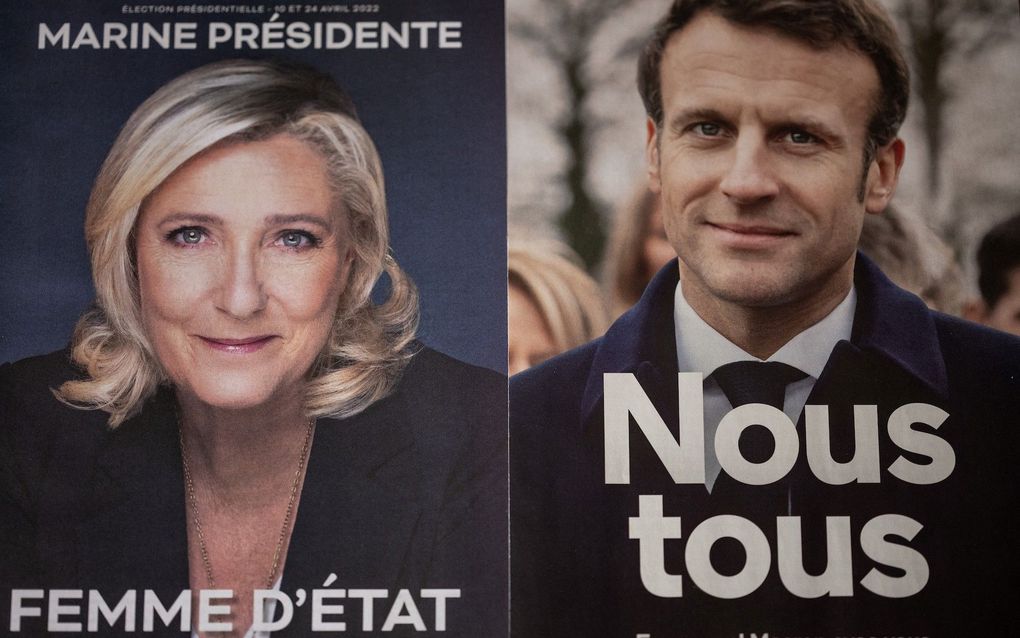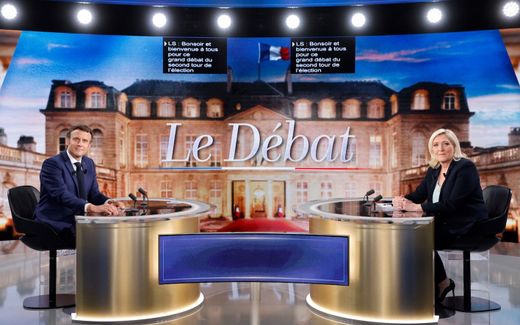French people choose between two world views
23-04-2022
Western Europe
Mark Wallet, RD

Tomorrow the French voters will decide who will be in government the coming five years. Photo AFP, Loic Venance
Western Europe
On Sunday, France will choose who will be president in the Elysée Palace for the next five years: Marine Le Pen or Emmanuel Macron. Macron has been gaining on Le Pen in the polls in recent days, but the margin is undoubtedly narrower than five years ago.
There is something to choose for the French on Sunday. Macron and Le Pen represent two profoundly different perspectives on France and the world. Their visions of Europe, NATO, the economy and immigration differ widely.
They are the views of two 'Frenchies'. In a nutshell, they are about the contrast between city and countryside, the well-to-do middle class versus those on modest incomes, the socially successful and those who feel culturally threatened.
Macron's commitment to the second round of elections is revealing: he has described it as "a referendum on Europe." In Le Pen's words, it is a struggle between "patriots" and "globalists." For Macron, the European Union means protection against crises and war, seeking stronger European autonomy in defence and agriculture.
Le Pen may have shelved her plea for an exit from the EU, but she wants to change it from the inside and return more sovereignty to member states.
Strong scepticism towards Europe
Europe stands for different world views but also various social positions. Especially in the backward part of France, there is strong scepticism towards Europe.
It is not without reason that Le Pen strongly emphasised purchasing power in her campaign. She promises to take a whole range of measures to lower the cost of living. She wants to abolish income tax for all French people under 30 and substantially reduce excise duties on fuel and a hundred other necessities of life.
These are measures that will put France in dire economic straits, Macron warns. However, many French people who struggle to survive know they are represented by Le Pen.
Macron has widened the lead
In the polls of recent days, Macron has widened his lead over Le Pen: the latest polls predicted a difference of at least 10 per cent. Shortly after the first round of the presidential elections, on 10 April, the margins were much narrower. Some polls even gave a result of 51-49.
The first round of the presidential election divided France electorally into roughly three camps of equal size. About a third of the French voted for a nationalist candidate (including Le Pen), a third for a centre-right, neoliberal candidate (including Macron) and a third for a far-left candidate (including Jean-Luc Mélenchon).
Seen in this way, Mélenchon's supporters are crucial in determining who will win the elections. But at least as necessary are the people who stay at home: in polls, more than a quarter say they will not vote on Sunday. It is, therefore, essential for both candidates to win the loyalty of precisely those voters.
In the second round, you vote for yourself
However, the French political scientist Dominique Reynié warns against differences in voting behaviour during the first and second rounds when making these kinds of calculations. "Voters who want to show their displeasure know that it costs them nothing in the first round," he explained in the French newspaper Le Figaro this week. "But in the second round, you vote for yourself. Then suddenly, you consider that a vote for Le Pen might endanger your savings. That's why I think Macron's strongest asset is security."

Specifically, Reynié thinks of Macron's position on NATO, which surveys show enjoys strong support among the French population, and the euro.
What is clear is that Le Pen's position is more solid than during the previous duel between her and Macron in 2017. Le Pen has increased her following, which analysts say she owes mainly to her strong focus in the campaign on purchasing power.
What may have helped her also is that she has polished off the sharpest edges of her programme. She has, in any case, put less emphasis on the most controversial themes. At the same time, old views of the Le Pen family have become less controversial: even a centre-right candidate such as Valérie Pécresse took strong positions on immigration and Islam during her campaign.
Protestant vote
However, the question is to what extent the party programme has changed under Marine Le Pen. The French newspaper Le Monde put it to the test by comparing the party programmes from 2007, when her father Jean-Marie Le Pen was still in charge, with those of 2012, 2017 and 2022. The newspaper especially noticed the significant continuity, especially in areas such as immigration and security. Of course, there were changes in capital punishment, Europe and the 35-hour week.
This continuity is reason enough for the Federation of French Protestants (FDF) to explicitly call on their supporters not to vote for Le Pen on Sunday. The federation mentions Le Pen's views on refugees and religious freedom. Representatives of the Jewish and Islamic communities also called for support for Macron. Chief Rabbi Haïm Korsa of Paris said that he fears a curtailment of religious freedoms for Jews and Muslims if Le Pen wins. Among other things, Le Pen favours a ban on ritual slaughter.
The Roman Catholic Church is more reticent. "We have to accept the democratic game," said the president of the French bishops' conference Mgr Éric de Moulins Beaufort, in Le Parisien. "Each citizen is perfectly capable of deciding for himself."
This article is translated by CNE.news and was published simultaneously on RD.nl.
Related Articles





